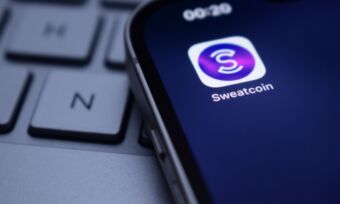7 of the best free sleep apps
We’re told to log off and step away from our screens before we go to bed. But could your phone actually hold the key to a good night’s rest?

We’re told to log off and step away from our screens before we go to bed. But could your phone actually hold the key to a good night’s rest?
KEY POINTS
- While smartphones and other electronics can keep you awake, sleep apps are available to help monitor your sleep cycles and provide soothing aid.
- There are many different sleep apps available, though most require paying a subscription fee to access the premium features.
- According to sleep experts, while there is a place for sleep apps, they don’t substitute for being respectful of your own sleep.
How can a smartphone help you sleep?
Smartphone, tablet and laptop use before bed can contribute to sleep disruption. Our screens emit blue wavelength light that experts say can suppress our melatonin production, making it harder for us to fall asleep. Plus, our devices are filled with distractions like emails and Instagram that can keep us mentally engaged when we should be winding down for the day.
But on the other hand, there are a variety of smartphone apps that promise to help you fall asleep, improve your quality of sleep and have you wake up feeling refreshed and well-rested.
To help you cut through the white noise, we’ll round up seven popular sleep apps, and get an expert’s verdict on the sleep app phenomenon.
1. Sleep Cycle
Sleep Cycle is a sleep tracker app that claims to monitor your sleep patterns and wake you up when you’ll feel the most rested. Before going to bed, you place your phone on your bedside table and set a 30-minute window for when your alarm will go off. The app can also be used with an iPad or Apple Watch. Sleep Cycle claims it uses your body movements to work out what sleep stage you’re in and it aims to wake you when you’re in light sleep (as opposed to deep sleep or REM sleep). The app also scores your sleep quality once you’ve used it a few times.
How much does it cost?
Sleep Cycle is free to download from the App Store and Google Play, with anoptional Premium subscription at $39.99 per year at the time of writing. Premium features include detecting snoring and other sounds, heart rate monitoring and the ability to add notes to each sleep session (like your caffeine intake and exercise during the day), so you can potentially see what’s affecting your sleeping patterns.
2. Calm Sleep
The sister app to the hugely popular Calm app, Calm Sleep offers a suite of guided meditations for restful sleep, as well as a library of ‘sleep stories’ designed to help lull you into a deep sleep. However, unlike the bedtime stories many of us listened to as kids, Calm’s sleep stories are voiced by a host of celebrities, including Matthew McConaughey, Harry Styles, and Stephen Fry, to name a few.
How much does it cost?
Calm Sleep can be downloaded from the App Store and Google Play, currently with a seven-day free trial on offer. A Calm subscription gives users unlimited access to Calm’s full collection. Following the 7-day free trial, your Calm subscription costs $8.33 per month, billed annually at $99.99 per year at the time of writing.
3. Headspace
Best known as a meditation and mindfulness app, Headspace also offers users bedtime meditations to help wind down before bed or fall back to sleep. Users can also listen to ‘sleepcasts’—podcasts that Headspace says are designed to create the right conditions for a restful sleep. Sleepcasts are between 45 and 55 minutes long and start with a wind-down exercise, such as breathing exercises and mindful body scanning (bringing awareness to different parts of the body). This is followed by a soothing voice describing different landscapes, such as a desert campfire or a tranquil lakeside lodge.
How much does it cost?
Headspace is free to download on the App Store and Google Play and offers some free introductory exercises. To access the full range of meditations, sleep sounds and more, you’ll need to pay for a subscription. You can choose between an annual subscription for $91.99 per year ($7.67 per month) after a 14-day free trial, or a monthly subscription of $19.99 per month after a 7 day free trial.
4. SleepWatch
SleepWatch is an AI-powered sleep-tracking app that can be used with an Apple Watch, Galaxy Watch, Galaxy Ring, Fitbit, or Pixel Watch. If you wear your watch to bed, the app will track things like your total sleep time, how much of your sleep is interrupted and your average sleeping heart rate. SleepWatch will also send you personalised notifications to help you optimise your sleep.
How much does it cost?
SleepWatch is free to download on the App Store and Google Play. SleepWatch Premium Membership is available with a yearly (US$39.99/yr) subscription.This gives you access to more advanced tracking, and allows you to score and compare your sleep, plus get bedtime reminders and free reports.
5. Pillow
Pillow is a sleep-monitoring app that can be used via your iPhone or iPad (placed face down on your mattress near your body) or with an Apple Watch. Pillow claims to track your sleep stages and includes an alarm clock that is designed to wake you up at your lightest sleep stage. Pillow says it calculates your sleep stages through your body movements and sounds and will also measure your heart rate if you’re using an Apple Watch. Pillow is only available on the App Store.
How much does it cost?
Pillow is free to download, currently only from the App Store. It has an optional Premium subscription starting from $14.99 monthly at the time of writing. Premium features include nap modes and the ability to record sounds so you can capture snoring, sleep apnea and sleep talking.
6. BetterSleep: Relax and Sleep
BetterSleep: Relax and Sleep, formerly known as Relax Melodies, aims to help you fall asleep through a mixture of sounds, sleep meditations, bedtime stories and breathing techniques. The app features over 200 sounds—including water, nature, ASMR and white noise—which you can mix and match together to create your own customised sleep soundscape. BetterSleep also offers ‘Sleep Moves’, which are body exercises and relaxation techniques that it says will help you wind down.
How much does it cost?
BetterSleep can be downloaded for free on the App Store and Google Play; however, this only gives access to limited features. You can currently get a free seven-day trial of all Relax Melodies Premium features, which gives you access to a wider range of features. After that, subscriptions start from $4.99 per month, billed yearly at $59.99 per year.
7. Rain Rain Sleep Sounds
Rain Rain Sleep Sounds offers a range of relaxing sounds designed to help you fall asleep. There’s everything from waterfalls to laundry machines to cats purring. The app allows you to mix and match sounds and save your favourite combinations.
How much does it cost?
Rain Rain is free to download on the App Store and Google Play. The free version includes access to over 50 sounds. You also have the option of subscribing to the premium version for $6.49 per month or $46.99 per year, which gives you access to additional sounds and is ad-free.
Please note that this is just a selection of some of the apps available. There are other sleep apps out there and we’re not making a recommendation about any of these platforms. It’s important to do your own research before deciding if any of these kinds of apps are suitable for you. Subscription prices may be in USD or other international currencies and may have changed since the time of writing.
What does a sleep expert think?
Sleep apps tend to make a lot of promises. But are we dreaming if we think they could actually work?
Dr David Cunnington, a specialist sleep physician and the co-director of Melbourne Sleep Disorders Centre, stressed that most sleep tracking apps had not undergone scientific evaluation.
“At a common sense level, something that sits on your bedside table and by measuring sounds tells you what your brain—a very complex organ—is doing, sounds like a bit of a stretch,” Dr Cunnington told Canstar.
In extreme circumstances, there’s also the potential that sleep tracking apps could cause sleep-related anxiety. Researchers have even coined the term ‘orthosomnia’ to describe a condition where patients using sleep trackers self-diagnose sleep disorders and become obsessed with achieving the ‘perfect sleep’.
Whether a sleep tracking app will be useful for you will depend largely on why you are using it and how you interpret the data, Dr Cunnington said.
“These types of things can be used helpfully if people are just curious about, ‘Am I allowing enough time to sleep?’ or ‘Am I getting roughly the right amount of sleep?’,” he said.
Additionally, while meditation and ‘distractor sounds’ like white noise may be helpful for sleep, Dr Cunnington noted there is also no evidence or research showing these particular apps are effective in improving sleep.
At the end of the day, Dr Cunnington said people should make sure they are being “respectful of their sleep”, adding that it was important to “recognise that we need to provide adequate time, an adequate place and adequate opportunity for sleep in our 24-hour day.”
 Psychiatric services
Psychiatric services
 Rehabilitation
Rehabilitation
 General dental
General dental
 Physiotherapy
Physiotherapy
 Psychiatric services
Psychiatric services
 Rehabilitation
Rehabilitation
 General dental
General dental
 Physiotherapy
Physiotherapy
 Psychiatric services
Psychiatric services
 Rehabilitation
Rehabilitation
 General dental
General dental
 Physiotherapy
Physiotherapy
 Psychiatric services
Psychiatric services
 Rehabilitation
Rehabilitation
 General dental
General dental
 Physiotherapy
Physiotherapy
 Psychiatric services
Psychiatric services
 Rehabilitation
Rehabilitation
 General dental
General dental
 Physiotherapy
Physiotherapy
 Psychiatric services
Psychiatric services
 Rehabilitation
Rehabilitation
 General dental
General dental
 Physiotherapy
Physiotherapy
 Psychiatric services
Psychiatric services
 Rehabilitation
Rehabilitation
 General dental
General dental
 Physiotherapy
Physiotherapy
Canstar may earn a fee for referrals from its website tables, and from Sponsorship or Promotion of certain products. Fees payable by product providers for referrals and Sponsorship or Promotion may vary between providers, website position, and revenue model. Sponsorship or Promotion fees may be higher than referral fees. Sponsored or Promoted products are clearly disclosed as such on website pages. They may appear in a number of areas of the website such as in comparison tables, on hub pages and in articles. Sponsored or Promoted products may be displayed in a fixed position in a table, regardless of the product’s rating, price or other attributes. The table position of a Sponsored or Promoted product does not indicate any ranking or rating by Canstar. For more information please see How We Get Paid.
Can my health insurance cover a sleep app subscription?
It’s unlikely that an everyday health insurance policy will cover a premium subscription to a typical sleep monitoring app, though you can always consider contacting your insurer to check. Some health insurers may include sleep app subscriptions as part of a promotion or offer; for example, eligible HCF members with hospital or extras cover can get a free 12-month Sleepfit subscription (terms and conditions apply).
Looking beyond sleep apps, if you experience sleep disorders such as sleep apnoea, your health insurer may cover access to sleep trials or other treatments as part of their hospital and extras packages.
Cover image source: FreshSplash/istockphoto.com
Talk to a health insurance specialist to find the policy that suits your needs
This article was reviewed by our Finance Editor Jessica Pridmore before it was updated, as part of our fact-checking process.

 Psychiatric services
Psychiatric services
 Rehabilitation
Rehabilitation
 General dental
General dental
 Physiotherapy
Physiotherapy
Try our Health Insurance comparison tool to instantly compare Canstar expert rated options.
Talk to a health insurance specialist to find the policy that suits your needs






